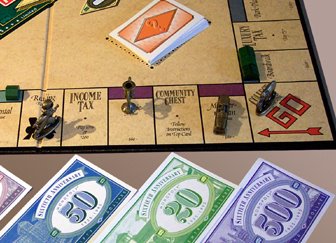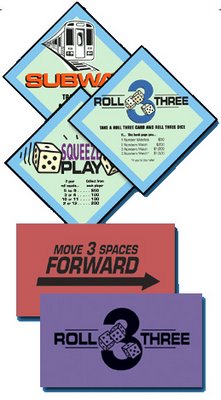 by Ward Batty
by Ward BattyMany love Monopoly but rarely manage to find the time to play it. As a cultural icon it is unmatched, but as a game it has problems that keeps it from being played as much as it might be, even by folks to love to play Monopoly. The drawbacks of Monopoly are that it is long, players are eliminated, and no amount of skill will overcome bad dice luck.
There are several good articles online on how to get the most out of your next game of Monopoly. According to Mark Jackson's website Game Central Station, the first thing is to make sure you are playing by the correct rules, as many folks aren't, and don't realize it. Jackson says the five biggest rules folks break and don't realize are
- Players don't collect any money for landing on "Free Parking"
- When a player lands on an unowned property and chooses not to buy it, that property is then auctioned
- There are a limited number of houses and hotels in the game, when they are all built no more are available
- Loans are not allowed
- Only tangible items can be traded. No "future passes" are allowed, for example.
At Erik Anderson's very useful boardgame site at About.com, he passes on a number of variant rule suggestions to improve the game play.
- Add movement cards to the game, alone or in combination with a die roll.
- End the game after the second bankruptcy.
- Add an auction to bid for turn order.
- Another fix for the turn order advantage would be for all players go once around the board before they can buy properties.
These and more suggestions can be found by searching for "Monopoly variant" on Google. I have, in the past, sped up the game by randomly dealing three properties to each player, which they pay for out of their $1,500. Another way to get in those extra games is to play it online, which speeds up the play by handling all the bookkeeping, if nothing else. Monopoly offers software for online play and you can get a free demo to try online. Games.com also offers online play. In the meantime, the next Monopoly World Championship is in 2007, so start practicing!
In other Monopoly-related news, the Monopoly Here and Now Limited Edition, released in England, features a made-over London board with updated graphics and prices, which now soar into the millions of pounds.
 RAD Games has created what they call the Super Add-Ons Monopoly Version. This is not an official addition to the game from Parker Bros. The Add-On consists of a smaller board sized so it can be set on top of the Monopoly board, covering the area inside the property spaces that players move along. The board is another track that contains additional properties such as "Wall Street" and "Fisherman's Wharf" as well as two new utilities, "Gas Company" and "Wireless Phone Company."
RAD Games has created what they call the Super Add-Ons Monopoly Version. This is not an official addition to the game from Parker Bros. The Add-On consists of a smaller board sized so it can be set on top of the Monopoly board, covering the area inside the property spaces that players move along. The board is another track that contains additional properties such as "Wall Street" and "Fisherman's Wharf" as well as two new utilities, "Gas Company" and "Wireless Phone Company."There are four corner spots. "Squeeze Play" lets you take money from other players. "Roll 3" allows all players the chance to collect extra money. "Pass" is like "Go" but pays $300 when passing and $350 if you land on it. "Subway" allows a player to move to any square on their next turn. Of note is the "Tax Refund" space that adapts, and improves upon the "Free Parking" variant that many play. Instead of collecting all the tax money, players collect half. This is a superior rule, as it guarantees there's always some money available and evens out that distribution. Players enter and exit the inset board via "Elevators" that are above two railroad spaces. They alter the movement pattern as even numbered rolls use the elevator to move from one board to the other while an odd roll continues down the current path, be it on the inside or outside. The game can also be played as a stand-alone game, without Monopoly. The Add-Ons concept is a clever one and RAD Games says they plan to continue with upcoming releases.
Photo credits, Monopoly 60th Edition ©2006 Ward Batty. Super Add-Ons art ©RAD Games.
Ward Batty is a long-time game-player who has been with the same weekly game group for over twenty years. "I understood there was a pension." is his excuse. He writes a monthly column on the business of board games for Comics & Game Retailer magazine and has written articles and reviews for The Games Journal, Scrye, Knucklebones and Games International.
The Game Table is a weekly column which is self-syndicated by the author. If you would like to see this column in your local newspaper, please write the managing editor of the paper. Interested in carrying The Game Table in your paper, please contact Ward Batty.
